Baker Academic Pauline Studies Collection (22 vols.)
Digital Logos Edition
For the most current version of this collection, see here.
Overview
The Baker Academic Pauline Studies Collection equips you with 22 volumes’ worth of recent Pauline study, putting the apostle’s life and thought under the microscope. It contains contributions from numerous scholars, including Craig S. Keener, John Piper, Gordon D. Fee, Moisés Silva, and Thomas R. Schreiner. This collection offers an analysis of Paul’s letters, including insight on interpreting each Pauline epistle. It brings to light Paul’s thoughts on marriage, women’s ministry, the Holy Spirit, the law, the covenant, Christology, pastoral ministry, and the mission of the church. Several volumes focus on Paul’s ethical and moral transformation, teaching, travels, theological contributions, and portrayals.
This title is included in the following collections
You can save when you purchase this product as part of a collection.
Baker Academic Biblical Studie...
$3,999.99$3,999.99Baker Ultimate Collection 2022...
$38,273.89$30,599.99
- Examines Paul’s life, conversion, teaching, and travels
- Analyzes the Pauline Epistles in their literary, ancient, and modern contexts
- Contains insights from numerous biblical scholars and theologians
- Title: Baker Academic Pauline Studies Collection
- Publisher: Baker Academic
- Volumes: 22
- Pages: 7,904
- Topic: Pauline Studies
- Opening Paul’s Letters: A Reader’s Guide to Genre and Interpretation, by Patrick Gray
- Jesus Have I Loved, but Paul?: A Narrative Approach to the Problem of Pauline Christianity, by J. R. Daniel Kirk
- Moral Formation according to Paul: The Context and Coherence of Pauline Ethics, by James W. Thompson
- Pastoral Ministry according to Paul: A Biblical Vision, by James W. Thompson
- Paul and the Mission of the Church: Philippians in Ancient Jewish Context, by James P. Ware
- Interpreting the Pauline Epistles, 2nd ed., by Thomas R. Schreiner
- Paul, His Letters, and Acts, by Thomas E. Phillips
- Paul, the Pastoral Epistles, and the Early Church, by James W. Aageson
- Paul and the Jews, by A. Andrew Das
- Paul, the Law, and the Covenant, by A. Andrew Das
- God’s Empowering Presence: The Holy Spirit in the Letters of Paul, by Gordon D. Fee
- Pauline Christology: An Exegetical-Theological Study, by Gordon D. Fee
- Apostle Paul: His Life and Theology, by Udo Schnelle
- Paul, Women, and Wives: Marriage and Women’s Ministry in the Letters of Paul, by Craig S. Keener
- Reading Romans through the Centuries: From the Early Church to Karl Barth, edited by Jeffrey P. Greenman and Timothy Larsen
- The Law and Its Fulfillment: A Pauline Theology of Law, by Thomas R. Schreiner
- Paul’s Metaphors: Their Context and Character, by David J. Williams
- Paul: His Life and Teaching, by John McRay
- Paul and the Miraculous: A Historical Reconstruction by Graham H. Twelftree
- Understanding Paul: The Early Christian Worldview of the Letter to the Romans, 2nd ed. by Stephen Westerholm
- Interpreting Galatians: Explorations in Exegetical Method, 2nd ed. by Moisés Silva
- The Justification of God: An Exegetical and Theological Study of Romans 9:1–23, 2nd ed. by John Piper
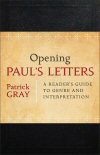
It is easy to forget that the books of the Bible are not really “books,” but individual documents composed in a wide array of literary genres. This clear, concise, and accessible text on the Pauline letters orients beginning students to the genre in which Paul writes. The book compares and contrasts Paul’s letters with ancient and modern letters. It reveals the distinctive conventions, forms, and purposes of Paul’s Epistles. It focuses on the literary genre of the letter in ancient Greece and Rome and provides an overview of subjects, strategies, and concerns of immediate relevance for readers who wish to understand Paul in his ancient context. Discussion questions are included.
Gray not only describes complicated literary matters in clear and accessible ways but also provides helpful examples to show how knowing this information enriches understanding. His advice to readers wisely makes genre and rhetoric the servants of interpretation rather than straitjackets that demand particular forms or turns in an argument. This combination of introducing new information and demonstrating nuanced usage is just what beginning students need. The balance and clarity of this volume make it an excellent supplement in a course on Paul.
—Jerry L. Sumney, professor of biblical studies, Lexington Theological Seminary
A superb guide to Paul’s letters, impressive in its command of the relevant ancient sources and current scholarly debates. Gray’s exposition reflects a gifted teacher’s instinct for connecting with students through astute use of popular culture and classic literary texts while giving due attention to the fascinating complexity of Paul’s ancient context.
—Carl R. Holladay, Charles Howard Candler Professor of New Testament, Candler School of Theology, Emory University
Appropriately interpreting a work entails recognition of its literary genre, and that is especially true for reading the Bible, which contains a wide variety of genres. Gray’s delightful new book provides useful guidance to students in learning how to read Paul’s letters as letters, doing so in light of ancient epistolary theory and practice and with an eye to how ancient conventions differ from those used today.
—John Fitzgerald, professor of religious studies, University of Miami
This is the best entry on the letters of Paul in print. Gray covers the basic areas with clarity and balance. He invites students to experience Paul by opening their eyes rather than narrowing them. The cultural examples are a model of pedagogy.
—Gregory E. Sterling, dean, Yale Divinity School
This book should become the go-to introductory book on Paul’s letters. Clearly written and carefully organized, it moves across the complicated landscape of Paul’s letters with ease. Gray always has the reader in mind—the reader of Paul and the reader of this book—as he raises and answers questions that are essential for understanding Paul and his literary setting.
—Gail R. O’Day, dean, Wake Forest University School of Divinity
Patrick Gray is the associate professor of religious studies at Rhodes College in Memphis, Tennessee. He is the author of Godly Fear: The Epistle to the Hebrews and Greco-Roman Critiques of Superstition and the coeditor of several books, including Teaching the Bible: Practical Strategies for Classroom Instruction.
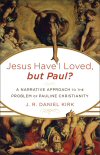
Students of the Bible are often drawn to Jesus’ message and ministry, but they are not always as positively inclined toward Paul. In this volume, Pauline scholar J. R. Daniel Kirk offers a fresh and timely engagement of the debated relationship between Paul’s writings and the portrait of Jesus contained in the Gospels. He integrates the messages of Jesus and Paul both with one another and with the Old Testament, and he demonstrates the continuity that exists between these two foundational figures. After laying out the narrative contours of the Christian life, Kirk provides fresh perspective on challenging issues facing the contemporary world, from environmental concerns to social justice to homosexuality. College and seminary students in New Testament and Pauline studies courses, pastors, and church leaders will value this work.
If a book about Jesus and Paul could ever be a page-turner, this is that book. Daniel Kirk invites us to learn from Paul as a faithful interpreter of Jesus, dispelling frequent misinterpretations of both the Lord and his apostle. As Kirk himself says, the heart of this volume is the claim that both Jesus and Paul tell the story of Israel’s God as a narrative that includes you, me, and the whole created order. If we listen to his wise counsel, we will become more faithful communities of the cross-shaped, life-giving gospel.
—Michael J. Gorman, professor of biblical studies, moral theology, and history, The Ecumenical Institute of Theology, St. Mary’s Seminary & University
The perceived tensions between the presentation of the life and message of Jesus contained in the Gospels and Paul’s account of that message are well documented and have been the subject of much historical and theological wrestling. In this volume Daniel Kirk outlines a narrative approach to Pauline Christianity that deconstructs some common and problematic assumptions as well as presents a compelling vision of Paul’s gospel that is in deep continuity with the message of Jesus. In so doing, he renders a Paul who speaks powerfully to the church of the twenty-first century and the world to which it is called to bear witness.
—John R. Franke, theologian in residence, First Presbyterian Church, Allentown, PA
[This book] may very well be a touchstone for the next generation of Christians who can’t accept the traditional Paul (on historical grounds) and yet who want to explore what Paul looks like if we begin with a more accurate understanding of Jesus, of Judaism, of the Bible’s Story . . . and of Paul himself.
—Scot McKnight, Karl A. Olsson Professor in Religious Studies, North Park University
The admirable and important goal of this study is to bridge the divide some Christians find between Jesus and Paul. . . . [Kirk] demonstrates that such a supposed divide does not do justice either to the gospels’ portrayal of Jesus or to Paul and his letters. . . . Kirk writes from an explicitly Evangelical background and vocabulary but Catholic readers will benefit, too, from his thoughtful approach.
—The Bible Today
J. R. Daniel Kirk is an assistant professor of New Testament at Fuller Theological Seminary in Menlo Park, California. He is the author of Unlocking Romans: Resurrection and the Justification of God as well as numerous articles.
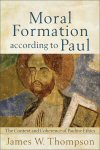
This fresh treatment of Paul’s ethics addresses this question: How, according to Paul, can Christian communities know how God wants them to live? Leading biblical scholar James Thompson explains that Paul offers a coherent moral vision based not only on Christ’s story but also on the norms of the law. Paul did not live with a sharp dichotomy of law and Gospel, and he recognized the continuing importance of the law. Thompson makes a distinctive contribution by locating the roots of Paul’s concrete ethical thought in Hellenistic Judaism rather than Hellenistic moral philosophy. Students of New Testament ethics and Pauline theology will value this work.
Books on the moral life according to Paul are relatively scarce. We can be grateful to Thompson for his lucid and readable survey of moral transformation in Paul. Comparing and contrasting Paul’s moral vision with both Greco-Roman and Hellenistic writers provides an illuminating social context in which to interpret Paul.
—Thomas R. Schreiner, James Buchanan Harrison Professor of New Testament Interpretation, The Southern Baptist Theological Seminary
This important study locates moral formation squarely at the heart of Paul’s letters—not by replacing ‘theology’ with ‘ethics’ but by demonstrating that Paul’s agenda was in fact the moral transformation of his communities. Thompson traces the roots of Paul’s moral teaching in the Old Testament and the story of Christ and exposes his indebtedness more to Hellenistic Judaism than to Greco-Roman moral philosophy. Crucially, he positions Paul’s writings in another ‘context,’ in communities of people who have begun new life in Christ, who await the final day, and for whom the present is about metamorphosis into a moral counterculture. Thompson does not try to answer all of our present-day questions; instead, he marks well the path for anyone wanting to explore the contours and coherence of Paul’s moral vision.
—Joel B. Green, professor of New Testament interpretation, Fuller Theological Seminary
This is an exceptionally well-thought-through and useful study of Pauline ethics.
—The Bible Today
Thompson’s work has many commendable features. He successfully makes the case that Paul’s ethic is a fundamentally coherent one. He further demonstrates continuity in Paul with the Old Testament’s summons to Israel to live in light of a distinctive identity grounded in their redemption by God. He also provides much exegetical support for what theologians have termed ‘the third use of the law’ in Paul’s ethical reflections. . . . Thompson has produced a helpful and engaging discussion of Pauline ethics. In its concern to set those ethics in their context, to demonstrate leading themes and commonalities within Paul’s ethical instructions, and to stress the fundamental coherence of Paul’s ethical reflection, Moral Formation according to Paul is a valuable resource for scholar and student alike.
—Themelios
Thompson has written a vitally important book, which shows beyond any doubt that Paul’s ethics are not some epilogue or uninteresting backwater in his epistles, but are a central and integral part of his total theological outlook. The book is clearly and concisely written, and one can follow the logic of the argument with great clarity. Moreover, Thompson demonstrates an able command of Pauline texts that takes his readers into a deeper understanding of many issues relating to Pauline moral instruction. . . . This book must be read by all New Testament scholars working in Pauline studies.
—Expository Times
James W. Thompson is the Robert and Kay Onstead Distinguished Professor of Biblical Studies and the associate dean of the Graduate School of Theology at Abilene Christian University. He is the editor of Restoration Quarterly and the author of several books, including Pastoral Ministry according to Paul, Preaching like Paul, The Beginnings of Christian Philosophy, and Hebrews in Paideia: Commentaries on the New Testament.
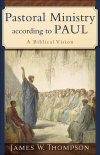
What is the ultimate purpose of pastoral ministry? What emphases and priorities should fuel the pursuit of this purpose? These are perennial questions engaged by pastors, the churches that employ them, and the seminaries that prepare them.
As a New Testament scholar who works at the intersection between biblical studies and practical ministry, James Thompson suggests that we need to recapture the theological foundation for understanding pastoral ministry. In this careful, contextual study of Pauline letters, Thompson draws out Paul’s vision and purpose for his ministry. He concludes that the goal of pastoral ministry is “transforming the community of faith until it is ‘blameless’ at the coming of Christ.” It is corporate, spiritual, and ethical growth that Paul focuses on, as opposed to the frequent contemporary focus on numerical growth and individual needs.
Thompson recognizes the historical and cultural gap between Paul’s ministry context and our own, and he nevertheless believes that this vision of ministry has profound implications for us today. He goes beyond the emphasis on pastoral roles and mere pragmatics of much of the “how to” literature and offers suggestions for application that are rooted in the eschatological and ethical goals of Paul’s vision of pastoral work.
Without a trace of academic disdain for the hands-on, how-to skills of the practice of Christian ministry, Thompson proposes to bridge the gap that often separates biblical theology and pastoral skills. As a respected New Testament scholar, he stands within the biblical message and asks how it can be implemented in a modern pastoral context. He does not deal in generalities, but in-depth studies of 1 Thessalonians, Galatians, Romans, and the Corinthian letters keep the study focused on the concrete grittiness of both text and contemporary situation.
—M. Eugene Boring, Emeritus I. Wylie and Elizabeth M. Briscoe Professor of New Testament, Brite Divinity School
The contemporary marketplace of pastoral ministry is long on practical directives, short on biblical and theological wisdom and purpose. Urging that, for Paul, ministry is partnership with God concerned with transforming faith communities, James Thompson both models how to read Paul theologically and with pastoral sensitivity and reconfigures the motivations, aims, and measures of pastoral ministry today. The result is a vision of ministerial formation and congregational shaping that challenges and inspires.
—Joel B. Green, professor of New Testament interpretation, Fuller Theological Seminary
This compact book presents a unified vision of pastoral theology based on a careful reading of Paul’s undisputed letters. . . . [Thompson’s] focus remains unremittingly pastoral. One gets a fairly comprehensive overview of Pauline theology in the book. . . . This book admirably fulfills its goal. I highly recommend it for seminary students, pastors, lay ministers, and anyone interested in the pastoral dimensions of Paul’s letters.
—Interpretation
With a great deal of emphasis these days on numeric growth, it is refreshing to find an author who points the theological criteria for growth as seen through Paul’s eyes.
—Leadership Journal
This is a fine book worthy of being studied by seminary and theology school faculty as well as by members of parish pastoral teams.
—The Bible Today
James W. Thompson is the Robert and Kay Onstead Distinguished Professor of Biblical Studies and the associate dean of the Graduate School of Theology at Abilene Christian University. He is the editor of Restoration Quarterly and the author of several books, including Moral Formation according to Paul, Preaching like Paul, The Beginnings of Christian Philosophy, and Hebrews in Paideia: Commentaries on the New Testament.
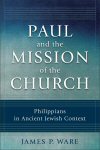
Paul and the Mission of the Church: Philippians in Ancient Jewish Context
- Author: James P. Ware
- Publisher: Baker Academic
- Publication Date: 2011
- Pages: 400
Did Paul urge Christians to engage in mission? What would that have meant in his setting? What should the church be doing now? This essential study examines Paul’s letter to the Philippians in its ancient Jewish context. It makes a convincing case that Paul expected churches to continue the work of spreading the Gospel.
This excellent book makes a strong and convincing case that Paul expected his converts to engage in mission. Along the way it sheds very important light on Jewish attitudes toward gentile conversion and offers some outstanding exegetical treatments of the Letter to the Philippians. This is a first-class contribution to scholarship that will delight all researchers in the field.
—John M. G. Barclay, Lightfoot Professor of Divinity, Durham University
In a culture that is increasingly inhospitable to the gospel, our interpretive lenses are sharpening the focus on the centrality of mission in the Bible. It is heartening to see the growing literature on this subject, especially among biblical scholars, and James Ware’s book will be another fine addition to this corpus. Against the important background of eschatology and mission in the Old Testament, Ware amply demonstrates the centrality of mission for Paul and the Philippian church in a time when the eschatological future of Isaiah has arrived. This book is fine biblical scholarship in the service of the missional church.
—Michael W. Goheen, Geneva Professor of Worldview and Religious Studies, Trinity Western University
This important study is thorough and insightful. Although Paul’s missionary activity is unprecedented in Judaism, his concern for the gentiles is completely in keeping with God’s ultimate purposes. The difference is that for Paul the eschatological future has arrived and is arriving. This book will be essential for discussions about the biblical and theological roots of Christian mission.
—Journal for the Study of the New Testament
In this fine book, James Ware presents one of the most helpful biblical-theological studies related to mission that has been published in recent decades. The work is clearly written, cogently argued, and helpfully summarized. For persons interested in a biblical theology of mission, the bibliographic material alone makes this book worth consulting. . . . Overall, I found Ware’s handling of both Second Temple Jewish literature and the Pauline writings excellent. . . . The book would make a nice supplementary text for an upper-level biblical theology or missiology class.
—Journal of the Evangelical Theological Society
Ware’s careful study, including its exploration of Jewish tradition, adds further depth to contemporary missiology.
—The Bible Today
James P. Ware is the associate professor of religion at the University of Evansville, where he teaches New Testament and ancient Christianity. He is the editor of Synopsis of the Pauline Letters in Greek and English.
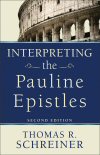
Leading Pauline studies expert Thomas Schreiner provides an updated guide to the exegesis of the New Testament epistles traditionally assigned to Paul. The first edition helped thousands of students dig deeper into studying the New Testament epistles. This new edition is revised throughout to account for changes in the field and to incorporate the author’s maturing judgments. The book helps readers understand the nature of first-century letters, do textual criticism, investigate historical and introductory issues, probe theological context, and much more.
This is a wonderfully clear and thorough guide. Schreiner draws on his decades of scholarship to paint a ‘big picture’ of how to read Paul’s letters. At the same time, he breaks the reading process down into smaller steps, and he illustrates those steps with numerous examples. For students who want to move from guesswork and random dabbling to informed, life-changing engagement with the divinely inspired writings of the apostle Paul, there is no better starting place.
—Robert W. Yarbrough, associate professor of New Testament, Trinity Evangelical Divinity School, Trinity International University
In a welcome update to a tried and trusted textbook, Tom Schreiner shows us how to find our way around Paul’s world, letters, language, culture, and theology. Whether one is deciphering Paul’s Greek grammar, learning how to follow his arguments, or studying Paul’s unique vocabulary, Schreiner is a reliable guide to the novice and veteran alike. Seminary students will be forever grateful to Schreiner for giving them this book!
—Michael F. Bird, lecturer in theology, Crossway College
The new, updated edition of Tom Schreiner’s excellent little book will be a boon to those who want to be responsible interpreters of Scripture. Although it specifically addresses the interpretation of Paul’s letters, its principles are appropriate to all biblical interpretation. Schreiner, himself a masterful exegete, writes with his typical clarity and with the conviction that these writings are the inspired word of God. Those who read and heed this practical handbook will be in a strong position to feed the flock of Christ.
—Donald A. Hagner, senior professor of New Testament, Fuller Theological Seminary
Thomas R. Schreiner is the James Buchanan Harrison Professor of New Testament Interpretation at The Southern Baptist Theological Seminary in Louisville, Kentucky. He is the author or editor of numerous books, including New Testament Theology: Magnifying God in Christ, Apostle of God’s Glory in Christ and Romans in the Baker Exegetical Commentary on the New Testament.
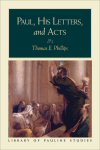
Aside from Jesus, the Apostle Paul had the greatest formative influence on the early Christian movement. Yet who was this passionate missionary who carried the message of Christ throughout the Mediterranean world? The New Testament writings give us not one but two portraits of Paul. We read numerous details of Paul’s life and relationships in the Book of Acts, and we find an additional set of details about Paul’s activities in his letters. Yet how consistent are these two portraits? And which one gives us the most accurate picture of the historical Paul? In this volume, Thomas E. Phillips examines the portrayals of Paul in recent biblical scholarship in light of these two major New Testament portraits. Believing the apostolic conference at Jerusalem to be a watershed event, Phillips draws conclusions that help contemporary readers get a more accurate picture of Paul.
Here is a helpful, detailed compilation of all the historical data that can be gleaned from Paul’s letters and from Acts in the attempt to determine whether the emerging pictures of Paul and his mission are compatible or otherwise. The author concludes that the pictures are somewhat divergent with Acts presenting a later, more attractive Paul, but he presents the evidence with such care and impartiality that readers are free to make their own decision on this complex issue.
—I. Howard Marshall, emeritus professor of New Testament exegesis, University of Aberdeen
In this carefully written and accessible book, Thomas E. Phillips shows that portraits of Paul vary widely according to how they see the relationship between Paul’s own letters and claims about Paul made in the Book of Acts. Some scholars discount what Acts says, while others use Acts to correct Paul’s statements. Phillips argues that, while Acts develops its own perspective on Paul, it also provides crucial information.
—Bruce Chilton, Bernard Iddings Bell Professor of Religion, Bard College
In this lively book Phillips revisits an old bone of contention in Pauline studies—relating the Paul of the letters to the Paul of Acts. Eschewing oversimplified and preordained responses, he carefully tabulates data sets from both sources, working through comparisons of Paul’s travels, broad cultural background, and relationships with other early church leaders and members to reach a final balanced and judicious weighting of the two sets of sources. The result is the crafting of a careful methodological and biographical trajectory that proponents of both sides of this frequently polarized debate will be able to trace through to arrive at a more reasoned and reasonable position. The main text is clear, with numerous jaunty analogies and metaphors; students in particular will benefit from its narratives, while scholars will profit further from the extensive annotations that Phillips supplies. Overall, Phillips is to be commended for bringing this critical set of questions within Pauline studies back into the foreground, and for engaging it with such sustained, disciplined, and frequently insightful enthusiasm.
—Douglas A. Campbell, associate professor of New Testament, Duke Divinity School
This book is particularly helpful . . . in showing many of the main issues on which debate over the compatibility of Acts and the Pauline letters focuses.
—Theological Book Review
Phillips has shown how a careful methodology can provide clearer data (e.g., the different images of Paul’s social status). This book . . . can serve as a good introduction to some issues that surround the relationship between the image of Paul in Acts and the historical Paul.
—Catholic Biblical Quarterly
Well-written and accessible. It will be of high value to advanced undergraduates, seminarians, pastors, and new scholars on Paul.
—Religious Studies Review
Thomas E. Phillips is a professor of New Testament and Early Christianity at Point Loma Nazarene University. He is the author or editor of several books, including Contemporary Studies in Acts and Acts and Ethics.
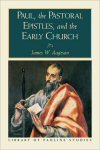
Paul’s influence on the history of Christian life and theology is as profound as it is pervasive. A brief survey of almost 20 centuries of Christian thought and practice will confirm the enduring importance of Paul for the life of the church in the Roman and Protestant traditions of the West as well as the Orthodox traditions of the East. Even as Christianity, at the dawn of its third millennium, has become increasingly global and traditions have come to develop and intersect in new and complex ways, Paul’s place in the story of Christianity remains deeply rooted in the church’s theology, worship, and pastoral life. In both past and present, Paul’s influence on the Christian church can hardly be overestimated.
Among the many intriguing issues generated by the historical Paul, his New Testament letters, and early church history is this question: what happened to Paul after Paul? Whether we think in terms of the reception of Paul’s theology, or the ongoing legacy of Paul, or early Christian reinterpretation of his letters, the questions persist: what did the early church do with Paul’s memory? How did it reshape his theology? And what role did his letters come to play in the life of the church?
The focus of the present discussion is on the early decades and centuries of Christianity, a time when the memory and legacy of Paul came to serve varied and often competing interests in the emerging church. It was a time when Paul’s reputation and importance to the church were being reinforced and when his epistles were gaining the authority that would ensure their place in the sacred library of Christianity. It was also the time when the Jesus movement forged itself into Christianity, a process in which Paul played a pivotal role and eventually also became an object of revision and transformation himself. What is virtually indisputable in this process is that Paul, during his lifetime and after, played a critical role in making Christianity what it was to become.
This insightful book shines new light on the Pastorals with careful comparisons of their thought and theology. Aageson artfully teases out their theological patterns to clarify their message. He is sensitive to the differences among the Pastorals, and he shows how those differences should shape our understandings of each epistle and the growth of the church. Aageson lays out the complexity of the issues that surround the Pastorals and the image of Paul in the early church and then comes to reasoned conclusions that take in those intricacies of historical circumstance and theological nuances and tensions. Beyond the Pastoral Epistles, Aageson dispels the notion that Paul was important in the second and third centuries primarily for heretics, who forced him on the rest of the church. Aageson uses his broad knowledge of the post-apostolic church and his multiplex approach to demonstrate how images of Paul were important for a wide cross-section of the church. He brings to light the multifaceted nature of the church’s historical development and so does not allow an imposed paradigm to dictate the outline of his reconstruction of its first three centuries of the church’s life. Aageson rewards his readers with insightful analysis of important literature that ranges over 300 years. He demonstrates clearly that his method of seeking patterns of thought has potential in many areas of biblical and post-biblical research.
—Jerry L. Sumney, professor of biblical studies, Lexington Theological Seminary
This is a valuable book for its fresh questions about the theological patterns in the Pastorals and for its comparison of them with the Apostolic Fathers and other early writers.
—Themelios
Aageson is to be commended for developing a new method, that of theological patterns, to investigate the Pastorals, Paul’s legacy, and what happened to Paul after Paul.
—Catholic Biblical Quarterly
This fascinating book provides a different approach to the Pastoral Epistles and fresh insights into their place in the history of the church and early Christian literature. . . . This is a book that I truly enjoyed reading, especially for its fresh approach and numerous insights. Particularly as a Roman Catholic, I hope that Aageson’s short, focused reflection on Scripture and tradition receives wide circulation. All things considered, ’kudos’ is the word that best sums up my reaction to this gem of a book.
—Interpretation
[A] highly readable study. . . . With commendable lucidity and convincing argumentation, Aageson uncovers the important place inhabited by the Pastoral Epistles in the developing Pauline tradition and provides a model for better understanding the powerful influence these writings have exercised over later developed conceptions of Paul and Pauline theology. It should be read by anyone remotely interested in the reception history of Paul’s epistles in the early church or in the development of early Christian doctrine and ecclesiology.
—Theological Book Review
James W. Aageson is a professor of religion and the chair of the Division of Arts and Humanities at Concordia College. He specializes in the study of early Judaism, Paul, and the history of the early church. Aegeson has traveled and studied widely in the countries where Christianity first developed.
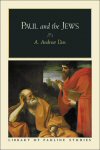
Paul and the Jews offers the beginning Pauline student an entrance into the interesting world of Pauline studies. Andrew Das examines the question, “How did Paul’s thinking compare with that of the Jews of his time?” He provides a survey of the scholarly views on this question and then presents his own conclusions.
Arguing for a newer perspective on Paul as a way to understand how the great Apostle viewed the Jewish people and their law in the light of Jesus Christ, Andrew Das has made a significant contribution to Pauline studies that will also serve as a firm exegetical footing for a constructive dialogue between Christians and Jews. Professor Das’ careful reading of Paul’s letters, especially Romans and Galatians, shows that while Paul affirms the centrality of Jesus Christ for salvation, Paul is not a super-sessionist. Paul and the Jews opens new vistas for those searching for an informed understanding of Paul’s thinking about Israel, its law, and its Messiah.
—Frank J. Matera, professor of New Testament, The Catholic University of America
The topic of Andrew Das’ new work requires that he address a whole series of issues that have proven controversial in recent Pauline scholarship: the two-covenant theory, the identification of the ‘weak’ and the ‘strong’ in Romans 14, the place of the law in the lives of Christians, and, of course, the ongoing debate between the ‘new perspective’ and traditional readings of Paul. All are tackled head-on in an accessible, informed, and balanced way. Das’ fresh—and thoughtful—proposals are sure to garner attention, and Paul’s impact on Jewish-Christian relations is the subject of stimulating reflections. A book for students and scholars alike.
—Stephen Westerholm, associate professor, McMaster University
A. Andrew Das is the Niebuhr Distinguished Chair and professor of religious studies at Elmhurst College in Illinois. He is the author of several books, including Paul, the Law, and the Covenant.
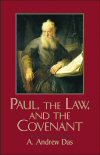
The now-familiar “new perspective” asserts that the “covenantal nomism” characteristic of second-temple Judaism softened the Mosaic law’s requirement of perfect obedience. Because of God’s gracious covenant with Israel, manifested in election and in the provision of atoning sacrifices, one could be righteous under the law despite occasional failures to obey the law perfectly. This view concludes that Paul, as a first-century Jew, could not have been troubled by the law’s stringent demands, because it was generally understood that the gracious framework of the covenant provided a way of dealing with occasional lapses. Consequently, it is claimed that Paul’s problem with the law must have to do with its misuse as a means of enforcing ethnic boundaries and excluding Gentile believers.
However, as Das demonstrates in this book, whenever the gracious framework of covenantal nomism is called into question, the law’s demands take on central importance. Das traces this development in a number of second-temple Jewish works and especially in the writings of Paul. “Covenantal nomism” is probably an apt characterization of Paul’s opponents, and indeed of Paul’s past life; thus, he can assert that formerly he was “blameless” under the law. But now Paul sees God’s grace as active only in Christ. He emphatically denies that God will show special grace in his judgment of Jews; to do so would be favoritism. Similarly, Paul sees no atoning benefit to the sacrificial system. In effect, Paul is no longer a “covenantal nomist.” Since the gracious framework of the covenant has collapsed, all that remains for Paul is the law, with its oppressive requirement of perfect obedience and ethnic exclusivism. Contra the “new perspective,” the “works of the law” should not be construed so narrowly as only the law’s ethnic exclusivity. Christ is “the end” of the law in general, both in the sense that he is the goal to which the law always pointed, and in that he is the sole agent of God’s grace apart from which the law’s demands would be impossible.
This is a significant contribution to the ongoing discussion of the place of the Jewish law in the theology of the Apostle Paul. Aware of the ‘new look’ in Pauline studies, and of the view of ’works-righteousness’ to which it is opposed, Dr. Das offers observations on a third way to view the law from the Pauline perspective. The argument is presented in a measured and judicious manner, and will repay careful reading.
—Paul J. Achtemeier, Emeritus Professor of Biblical Interpretation, Union Theological Seminary
This book is an important exploration of the current debate about Paul’s understanding of the Jewish Law in the light of the reevaluation of the issue connected especially with the scholarship of E. P. Sanders. Andrew Das reexamines the Jewish and Pauline texts and explores the nooks and crannies of the recent debates with a sharp eye for dubious arguments. He makes a good case that it is time to move beyond the ‘covenantal nomism’ theory and combine Sanders’ new perspective with a realization that Paul, after all, was concerned about self-righteousness.
—David M. Hay, Joseph E. McCabe Emeritus Professor of Religion, Coe College
Andrew Das has written an ambitious and wide-ranging study that offers a serious sustained critique of the ‘new perspective’ on Paul’s teaching about the Law. He joins Schreiner and Westerholm in challenging the currently popular view of Dunn, Wright, and others that Paul’s critique of Law is aimed primarily at Jewish particularistic nationalism. Das has done an impressive job of sifting through the voluminous secondary literature on Paul and the Law, forming intelligent critical judgments, and maintaining a consistent position of his own while engaging most of the key passages in Paul’s letters. This book is a solid and professional piece of work that needs to be heeded in contemporary debates about Paul and the Law. I have certainly learned in reading it to be more nuanced in some of my own formulations.
—Richard B. Hays, George Washington Ivey Professor of New Testament, Duke University
The work offers a sustained critique of the so-called ‘new perspective’ on Paul’s teaching about the Law. Das joins Thomas Schreiner and Stephen Westerholm in challenging the currently popular view of James Dunn, N. T. Wright, and others that Paul’s critique of the Law is aimed primarily at Jewish particularistic nationalism.
—International Review of Biblical Studies
Anyone interested in Pauline studies, and in the New Testament texts examined by Das, will find his study both stimulating and beneficial and might breathe a sigh of relief that a ‘newer perspective’ on Paul has dawned.
—Southwestern Journal of Theology
This book is a detailed and careful study that takes into consideration the main line of thought in recent Pauline scholarship. However, it refuses to be ‘uncritical,’ accepting its findings as final. For that reason, Das offers a valuable contribution to the ongoing debate. . . . However, while reading this book we are reminded that Sanders’ Covenantal Nomism is still waiting for a ‘newer perspective,’ that will look at the ‘patterns of religion of both Judaism and Paul from 30 years of distance.’ Whoever will have the depth and breadth to undertake that project would be well served by consulting Paul, the Law, and the Covenant.
—Ashland Theological Journal
A. Andrew Das is a Niebuhr Distinguished Chair and professor of religious studies at Elmhurst College in Illinois. He is the author of several books, including Paul and the Jews.

God’s Empowering Presence is a fresh and original analysis of all the passages in the Pauline corpus that concern the Holy Spirit, including Ephesians, Colossians, and the Pastoral Epistles. Through comprehensive lexical, historical, and grammatical study, Fee provides an exegesis of every Spirit text in Paul’s writings. He investigates the Holy Spirit’s crucial roles in Pauline theology: eschatological fulfillment, divine Person of the Trinity, and evidence for and guarantee of salvation.
Fee’s book is the most comprehensive treatment available of Paul’s understanding of the Holy Spirit, a topic that has rarely received sufficient attention in studies of Pauline theology. Fee’s method is exemplary: he first analyzes Paul’s statements about the Spirit in each individual letter and then moves to a synthesis of Paul’s general pneumatology. The result is a book that is deeply exegetical, doing justice both to the particularity of Paul’s writings and to the fundamental unity of his vision for the Spirit’s role in the life of the Christian community. Most importantly, Fee emphasizes insistently that the Holy Spirit must be experienced as a living presence within the church. That message is both faithful to Paul and urgent for the community of faith in our time.
—Richard B. Hays, George Washington Ivey Professor of New Testament, Duke University
With the energy and care that is a trademark of his work, Gordon Fee here fills a significant gap in Pauline studies. Both those who find talk about the Holy Spirit congenial and those who would happily marginalize it will be instructed by this book. Fee makes a genuine contribution as he examines Paul’s letters in conversation with both the exegetical tradition of the academy and the pressing needs of the church.
—Beverly R. Gaventa, Helen H. P. Manson Professor of New Testament Literature and Exegesis, Princeton Theological Seminary
Fee uniquely combines professional competence as a text critic, an exegete, an author and editor of major commentaries, and a foremost evangelical interpreter of Paul with a lifetime of formation and ministry among the Pentecostals—this century’s providential witnesses to the work of the Spirit of God among us. . . . Fee’s work offers an enduring encyclopedia of Pauline pneumatological exegesis, easy to consult for next Sunday’s sermon . . . a must-have, within arm’s reach, for serious interpreters of Paul’s gospel. . . . Fee’s work is the theological crown of a distinguished exegetical career.
—Russell P. Spittler, senior professor of New Testament, Fuller Theological Seminary
Gordon D. Fee is an emeritus professor at Regent College in Vancouver, British Columbia. He is the author of several books, including the popular How to Read the Bible for All Its Worth, as well as many commentaries.
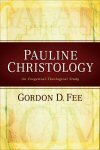
In Pauline Christology, author Gordon Fee provides a detailed analysis of the letters of Paul (including those whose authorship is questioned) individually, exploring the Christology of each, and then attempts a synthesis of the exegetical work into a biblical Christology of Paul.
The author’s synthesis covers the following themes: Christ’s roles as divine Savior and as preexistent and incarnate Savior; Jesus as the Second Adam, the Jewish Messiah, and Son of God; and Christ as the Messiah and exalted Lord. Fee also explores the relationship between Christ and the Spirit, and considers the Person and role of the Spirit in Paul’s thought. Appendixes cover the theme of Christ and Personified Wisdom, as well as Paul’s use of Kurios (Lord) in citations and echoes of the Septuagint.
Gordon Fee . . . is one of the foremost Evangelical scholars in North America. He brings his great erudition and theological insight to bear on the topic of Paul’s Christology, which strangely, as Fee points out, has not been the subject of many explicit book-length studies. This work, encyclopedic in its length and format, goes a long way toward making up for such neglect. . . . The exegetical groundwork of the first section is followed by a second half of the volume that weaves the conclusions from these studies into a synthesis under various titles . . . or categories of interpretation. . . . There is no doubt that this substantial study will be a reference point for some time to come.
—The Bible Today
This is a monumental book—in some respects, even a watershed book—in both size and significance.
—Catholic Biblical Quarterly
Fee’s book is the most thorough and compelling account of Paul’s Christology to date and is nothing short of a great achievement. It is sure to remain the standard in the field for some time to come.
—Review of Biblical Literature
Pauline Christology is a very welcome addition to Pauline studies, filling a gap in the scholarly literature. It is essential reading for New Testament scholars, and of course, especially for those who know and love Paul.
—Journal of the Evangelical Society
This is a conservative yet innovative work. It is conservative inasmuch as it rejects any attempt to minimize the centrality of preexistence and incarnation in Pauline Christology. It is innovative in its understanding of the role that the Septuagint and its Kyrios title play in Pauline Christology. Fee’s work is the most complete and thorough presentation of Pauline Christology presently available.
—Theological Studies Book Reviews
Fee is a master writer, exegete, and commentator—three ingredients of his scholarship that come to the fore in this book. . . . Readers who have some acquaintance with Greek language and grammar will best be able to follow Fee’s arguments. Fee does, however, provide an English translation and grammatical structure, which parallels the Greek text being discussed. So general readers can excavate the essence of Fee’s main points. . . . The major benefit for readers is the strong emphasis on the supremacy of Christ. Fee powerfully conveys Paul’s Christocentric worldview.
—Bibliotheca Sacra
Gordon D. Fee is an emeritus professor at Regent College in Vancouver, British Columbia. He is the author of several books, including the popular How to Read the Bible for All Its Worth, as well as many commentaries.
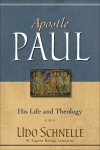
This comprehensive introduction to Paul by a leading European scholar, proceeding on the basis of the rootedness of the apostle’s letters in particular concrete circumstances, carefully lays out what can be known of those circumstances on the basis of the available evidence. It then interprets the letters in light of their life setting en route to a comprehensive and coherent description of Paul’s theology. Now available in a lucid translation by a respected American scholar who has adapted the bibliographical documentation for English-speaking students, Schnelle’s introduction is sure to become a leading textbook for graduate students and seminarians and a major point of reference for their professors.
Among recent studies of Paul’s life and thought, Schnelle’s deserves to be ranked not only as one of the most comprehensive but also as one of the most compelling. With methodological clarity and exegetical skill, he demonstrates that the apostle’s theology has to be understood in relation to his ministry and that this requires an examination of his letters individually, in the light of their respective historical, situational, and cultural contexts. Schnelle’s exposition of the basic structures and overarching themes of Paul’s theology is the more credible for being so carefully grounded and is an outstanding contribution to the ongoing discussion of this critical topic.
—Victor Paul Furnish, University Distinguished Emeritus Professor of New Testament, Southern Methodist University
Finding the way into the complexities of international research on St. Paul’s life, letters, and theology is far from easy. Professor Schnelle’s richly documented and well-argued work, now in English, provides a very useful guide. It is to be recommended as indispensable to serious students in seminary, master’s, and doctoral programs, not to forget us teachers who need to stay ahead of the best among the next generation.
—Hans Dieter Betz, Shailer Mathews Emeritus Professor of New Testament, University of Chicago
Udo Schnelle has established himself as one of Europe’s most accomplished and eloquent biblical interpreters. Much of his work to this point has concentrated on the Johannine literature, but now he turns his exceptional abilities to an interpretation of the Pauline literature. The translation of this massive and comprehensive study of Pauline theology from its original German was done by Eugene Boring, a fine American scholar in his own right, and we own him a debt of gratitude for this labor of love. . . . The clarity and competence of Schnelle’s portrayal of Paul make this a most valuable resource.
—Bible Today
A comprehensive introduction. . . . Schnelle’s work wisely exhibits discipline and restraint, lest innovation and speculation move us too far away from terra firma.
—Biblical Archaeology Review
[Schnelle] has produced an amazingly comprehensive book on the apostle, in which he sets the treatment of the seven undisputed letters in the context of Paul’s life and ministry, and then sketches thoroughly Paul’s theology. I do not know when in recent years a scholar has grappled with the history behind Paul’s life and produced as coherent a statement of Paul’s thought as it arises out of the circumstances of his ministry. This massive book will no doubt be read primarily by scholars and graduate students and perhaps serve as a textbook or resource for others. Eugene Boring ably translates the book and adapts the bibliographical documentation for English-speaking readers. . . . Schnelle’s work represents an important milestone in Pauline studies. It will be a major conversation-partner for scholars for a long time to come.
—Interpretation
Udo Schnelle is a professor of New Testament at the University of Halle in Germany. He is the author of numerous works, including Theology of the New Testament, translated by M. Eugene Boring.

Paul’s letters stand at the center of the dispute over women, the church, and the home, with each side championing passages from the Apostle. Now, in a challenging new attempt to wrestle with these thorny texts, Craig Keener delves as deeply into the world of Paul and the apostles as anyone thus far. Acknowledging that we must take the biblical text seriously and recognizing that Paul’s letters arose in a specific time and place for a specific purpose, Keener mines the historical, lexical, cultural, and exegetical details behind Paul’s words about women in the home and ministry to give us one of the most insightful expositions of the key Pauline passages in years.
This book can be of great help to any person seriously interested in examining why Paul said some of the things he did about women in marriage and women in ministry.
—Alvera Mickelsen, board member, Christians for Biblical Equality
For those comfortable with traditional Pauline ‘arguments’ concerning the subordination of women in the church and home, Keener presents more than they ever wanted to know about Paul’s intended meaning. But for those struggling to understand Paul’s full purpose for women, in his time and ours, Paul, Women, and Wives will prove to be ‘must’ reading. Keener’s comprehensive bibliography and literature review are alone worth the price of the book.
—Robert K. Johnston, professor of theology and culture, Fuller Theological Seminary
This book closely examines Paul’s teaching on women. Written by top-notch biblical scholar Craig S. Keener, Paul, Women, and Wives sets each passage in its historical cultural setting, and then interprets the passage in a way that draws out both the historical meaning and God’s word for today.
—Worship Leader
Craig S. Keener is a professor of New Testament at Asbury Theological Seminary. He is the author of many books, including The IVP Bible Background Commentary: New Testament, The Historical Jesus of the Gospels, Gift and Giver, and commentaries on Acts, Matthew, John, Romans, 1–2 Corinthians, and Revelation.
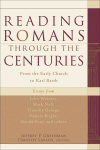
In the 16 searing chapters of his Letter to the Romans, Paul gets to the heart of the Law and the Gospel—of how human beings can be saved through the death and resurrection of Jesus Christ and attain eternal life. In the process, he touches upon such perennially important topics as predestination, the role of the Jewish people in salvation history, and the responsibility of Christians to those in authority.
Not surprisingly, Romans has been used as cannon fodder in many of the theological disputes that have divided Christendom. Martin Luther, whose views lit the firestorm of the Reformation, claimed Romans had shown him that God declared sinners righteous and good works played no part in salvation. Thomas Aquinas and John Calvin both saw in Romans God’s predestination of the elect, although they differed over whether humans were given the freedom to reject the offer of salvation.
Reading Romans through the Centuries brings noted historians and theologians together to discuss how Luther, Aquinas, Calvin, and nine other leading lights of church history understood Romans. Many see Romans as the first truly theological work in the history of the church, and this book shows why it has had such a profound effect on the history of the church.
This helpful book attempts to trace how Paul’s most famous writing has been understood by several of its more influential readers. . . . Each of the chapters provides well-written summaries of seminal issues, though the contributions vary significantly in style and specificity. . . . The obvious strength of such variety is that the contributors are free to discuss what they find to be the most salient issues at hand. . . . This volume will find appreciative readers from a variety of disciplines (e.g. biblical studies, history, theology) who seek to understand better the role Romans has played in shaping Christian thought.
—Reviews in Religion and Theology
This collection of essays makes a welcome contribution to the growing interest in the Bible’s history of interpretation. . . . This reviewer feels that study of the Bible’s history of interpretation needs to adopt a more synthetic perspective lest it become an exercise merely in collecting various curiosities of interpretation. This book provides the raw material for just such a discussion.
—Journal for the Study of the New Testament
The history of biblical interpretation has become a strong focus of scholarship today, and this lucid volume makes a fine contribution to this body of writings.
—Bible Today
One of the more valuable features of this collection is that nearly half of the authors had to go hunting beyond commentaries and into sermons, devotional literature, theological treatises, and essays in order to discuss the views of the theologians presented. . . . If the question is raised about impact on the whole theological enterprise, most of the interpreters chosen for discussion in this volume have been at the forefront.
—Lutheran Quarterly
The volume successfully lays out how Romans has been read through the centuries and urges contemporary readers of Paul’s letter to consider past attempts to understand Romans instead of simply assuming that recent commentators have a monopoly on exegetical truth.
—Themelios
The volume is rich and substantial. . . . One is left sated by this volume’s weight of content.
—Review of Biblical Literature
These studies introduce fresh insights into the central place of Romans in Christian thought through the centuries. They reveal key issues in theology, soteriology, and Christology with which scholars have wrestled for the past two thousand years. Consequently, they provide tools for evaluating both the utility and limitations of present critical methods.
—Toronto Journal of Theology
Jeffrey P. Greenman is a professor of Christian ethics and the associate dean of biblical and theological studies at Wheaton College. He is the author of Ancient Faith for the Church’s Future.
Timothy Larsen is the Carolyn and Fred McManis Professor of Christian Thought at Wheaton College in Wheaton, Illinois. He is the editor of Biographical Dictionary of Evangelicals and a coeditor of Women, Ministry, and the Gospel.
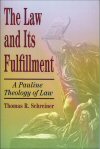
Thomas Schreiner’s The Law and Its Fulfillment is an excellent evangelical synthesis and critique of Paul’s theology. The major purpose of this volume is to build an accurate, relevant understanding of Pauline theology for students, pastors preaching on Paul’s letters, and those who want to understand how to relate God’s holiness and mercy in greater depth. Schreiner explains, “Grasping Paul’s theology [of the law] is essential for understanding his soteriology, the death of Jesus, Christian ethics, the relationship between Jews and Gentiles in the new community, and the continuity and discontinuity between the Testaments.”
In this excellent book Professor Schreiner reasserts the traditional Protestant understanding of Paul’s approach to the Mosaic law with clarity and exegetical rigor. These qualities have made his treatment of this hotly contested issue one of the standard works in the field.
—Frank Thielman, Presbyterian professor of divinity, Beeson Divinity School, Samford University
Schreiner offers a reliable guide to the recent discussion in readable style, helping us know where our views should change and where Calvin and Luther remain on target. Overall Schreiner’s book remains an excellent evangelical synthesis and critique of the issues.
—Craig L. Blomberg, distinguished professor of New Testament, Denver Seminary
A trustworthy guide through the thicket of current discussion, Dr. Schreiner provides thoughtful analysis and his own balanced conclusions. This rewarding book is marked by evenhandedness, clear thinking, first-rate scholarship, and above all by solid, faithful exegesis. One of the most helpful discussions available.
—Donald A. Hagner, senior professor of New Testament, Fuller Theological Seminary
The place of the law in the theology of Paul is one of the most difficult and disputed areas in contemporary New Testament study, not least since the advent of the so-called ‘new perspective’ on Paul some 20 years ago. . . . [Schreiner’s] comprehensive work addresses the major issues, engages in a careful exegetical study of the significant Pauline texts relating to the law, interacts with a wide range of secondary literature bearing on the major theological issues, and carefully nuances his conclusions. Dr. Schreiner defends the historic Protestant viewpoint with clarity and conviction. He writes in an irenic spirit, and treats differing positions fairly and courteously. Even if readers disagree on particular points they will be grateful to him for having laid out the issues so clearly.
—Peter O’Brien, senior research fellow in New Testament, Moore College
Thomas R. Schreiner is the James Buchanan Harrison Professor of New Testament Interpretation at The Southern Baptist Theological Seminary in Louisville, Kentucky. He is the author or editor of numerous books, including New Testament Theology: Magnifying God in Christ, Apostle of God’s Glory in Christ, and Romans in the Baker Exegetical Commentary on the New Testament.
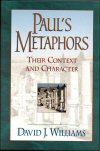
Paul’s writings are laced with vivid images from the bustling New Testament world. To understand these metaphors, David J. Williams delves into that Greco-Roman world and uses ancient sources to explore a wide variety of topics, such as architecture, law, commerce, health care, and education. Williams studies this world in chapters with such titles as “Life in the City,” “Family Life,” “Slavery and Freedom,” “Citizens and Courts of Law,” “Travel,” and “Warfare and Soldiering.”
Paul’s metaphors, set apart in bold type, are examined in the light of this background information and restored to their original vitality. Well-known metaphors—the Christian as a slave of Christ, the church as a body, Paul’s two natures being at war within him, the Christian as an athlete striving toward the prize, Jesus’ return as a thief in the night, Christians as adopted heirs of God—and lesser-known metaphors alike come to life for the modern reader through Williams’ careful exposition.
The main text is accessible to the general reader; scholars will appreciate footnotes that discuss the Greek text and provide resources for further study. Appendix 1 lists a select chronology of the Roman Empire, and Appendix 2 provides dates and descriptions of significant ancient authors and tests. Scripture, ancient source, and modern author indexes add to the usefulness of this work.
Paul’s Metaphors: Their Context and Character merits the attention of every serious student of the Apostle to the Gentiles. Gathering under 12 headings the profusion of metaphors that Paul poured into his writing, David Williams has created an indispensable aid for writers of commentaries, crafters of sermons, and just ordinary readers of Paul’s letters. Researched carefully and documented copiously, Paul’s Metaphors is nonetheless a strikingly readable book that demonstrates once again that students of the New Testament cannot neglect the hard work of philology.
—E. Glenn Hinson, senior professor of church history and spirituality, Baptist Seminary of Kentucky
David J. Williams served as the vice principal of Ridley College, University of Melbourne. His publications include The Promise of His Coming and Acts and 1 and 2 Thessalonians in the New International Biblical Commentary: New Testament series.

The apostle Paul and his significance in the New Testament and Christianity is a perennial topic of interest, but few evangelical surveys of his life offer a truly holistic picture of the man and his world. To fill the void, John McRay offers Paul: His Life and Teaching.
This scholarly yet accessible work explores the apostle’s pre-conversion days, missionary travels, and theological contributions. A specialist in archaeology, the author draws on his more than 40 years of teaching experience, as well as knowledge gained from extensive travels to the places Paul visited. Paul is a comprehensive and readable presentation of Paul’s ministry and theology that weaves together historical backgrounds, archaeological discoveries, and theological themes.
The book is divided into two parts. The first part examines aspects of Paul’s life as a Roman citizen and the leader of the early Christian church, including Paul’s place within the Jewish rabbinic traditions. McRay details Paul’s sudden, intense conversion and the beginning of his ministry and concludes with an exploration of Paul’s journeys. The second part offers a detailed treatment of the form, structure, and theology of Paul’s letters as they relate to the world in which he lived; it also highlights their continuing importance today. Included in this examination are discussions of Paul’s theology of the atonement, understanding of the Law of Moses, and view of the church.
Professors and students will appreciate the book’s broad scholarship and the pedagogical features found throughout, including links to other resources, maps, diagrams, and photos taken by the author during his travels. Pastors and church leaders will use it as a reference, and laypeople will gain a deeper understanding of Paul and his contribution to the Christian church.
The strength of this book is the author’s extensive knowledge of the geography and archaeology of the ancient Mediterranean world.
—Choice
A significant introduction to the life and work of the apostle Paul.
—Preaching
A good introduction to the apostle’s life and teaching.
—Mennonite
[McRay] has written a work that fills a definite gap. . . . This book is a significant contribution to Pauline studies. As one of the few substantial works on Paul written by an evangelical, it will probably find its place as a textbook in many colleges.
—Westminster Theological Journal
The presentation is clear and illuminating, and many will profit from the author’s expertise.
—International Review of Biblical Studies
Having travelled to the Mediterranean world more than 60 times, [McRay] has an encyclopedic knowledge of his subject and is a leading scholar in his field. Those who have read his earlier work will welcome McRay’s efforts to devote his considerable skills to the life and teaching of the apostle Paul. . . . McRay describes most of the places that Paul visited in Acts. Typically he provides more historical and geographical information than is given by commentaries on Acts. This feature makes the book a very useful companion volume for the student of Acts. . . . McRay’s strengths lie in the fields of archaeology and history. . . Where the book deals with Paul’s background and the details of Acts, it is a veritable treasure trove of information and insights. . . . For the reader who is interested in the life and times of Paul and the historical background to his missionary endeavors, this is an excellent read.
—Vox Reformata
John McRay is the emeritus professor of New Testament and archaeology at Wheaton College Graduate School. He is the author of Archaeology and the New Testament and coauthor of Bible Archaeology.
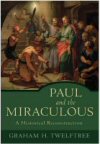
Paul and the Miraculous: A Historical Reconstruction
- Author: Graham H. Twelftree
- Publisher: Baker Academic
- Publication Date: 2013
- Pages: 416
How can we explain the difference between the “miraculous” Christianity expressed in the Gospels and the nearly miracle-free Christianity of Paul? In this historically informed study, senior New Testament scholar Graham Twelftree challenges the view that Paul was primarily a thinker and reimagines him as an apostle of Jesus for whom the miraculous was of profound importance. Highlighting often-overlooked material in Paul’s letters, Twelftree offers a fresh consideration of what the life and work of Paul might teach us about miracles in early Christianity and sheds light on how early Christians lived out their faith.
Graham H. Twelftree is a distinguished professor of New Testament at Regent University’s School of Divinity in Virginia Beach. He is a member of the international Studiorum Novi Testamenti Societas and of the editorial board of the Journal for the Study of the Historical Jesus.
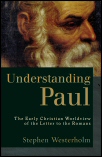
In his study of Paul, Stephen Westerholm suggests that despite the unparalleled influence the apostle has exercised over the last 2,000 years, he is little understood by contemporary readers because they often read the Pauline Epistles from the largely unconsidered presuppositions of modern culture. To counter that perspective, Westerholm proposes investigating the mindset of Paul himself.
Westerholm’s well-crafted book presents an insightful survey of the apostle’s thought world. It focuses on the Epistle to the Romans as the most thorough and detailed account of Paul’s convictions regarding Christian life and doctrine. Westerholm uses the letter of Romans as a guide to the themes that were most important for the apostle, revealing the fundamental elements of Paul’s thought and the Jewish tradition from which it emerged. Following the thematic approach of the epistle, he considers each subject in the order it was taken up by Paul. Along the way, he delves into the writings of the Old Testament and their influence on Paul, presenting the issues in a manner that will challenge contemporary readers to rethink their ideas about faith, belief, and the life well lived.
Accessible yet challenging, written with clarity and lightness of touch, uncluttered with citations of secondary literature yet brimming with biblical references, this book aims to show you how Paul thought about life, while bidding you to think about your own—and it succeeds brilliantly in that aim. . . Highly recommended.
—R. Barry Matlock, lecturer, The University of Tennessee
If C.S. Lewis had been a biblical scholar, he would have written a book like this one. Westerholm combines scholarly precision, delightful prose, and a sympathetic reading of Paul to produce a book that is difficult for anyone—whether scholar, student, or curious inquirer—to put down.
—Frank Thielman, New Testament scholar and the Presbyterian professor of divinity, Beeson Divinity School
This is a sparkling introduction to Paul’s thought, written with uncommon verve. Westerholm uncovers the gap between Paul’s presuppositions and those of the modern West but provokes us into taking Paul seriously and widening our limited horizons. Students will find this an engaging guide to Paul in general and Romans in particular; scholars will be challenged to match Westerholm’s brilliance as a communicator.
—John M.G. Barclay, Lightfoot Professor of Divinity, University of Durham
It is difficult to imagine anyone who would not profit from this engaging and well-written introduction to Paul’s thought and world. Since Romans forms the basis of the engagement, Paul’s essential themes emerge. Westerholm has succeeded well in his task of showing moderns what makes Paul tick. This would be a great textbook in a course on the entire New Testament or on the epistles in which only one small volume had to serve to introduce Paul’s thought.
—William W. Klein, professor of New Testament, Denver Seminary
The goal is to make comprehensible the major components of Paul’s vision of life as they are raised in his most important letter. Its purpose is realized in an admirable way.
—Charles H. Talbert, distinguished professor of religion, Baylor University
Challenging, provocative, biblically informed, lucid, and well-written. . . I join with others in proclaiming that the book deserves a wide audience and sets a high standard for religious dialogue.
—Richard N. Longenecker, professor emeritus of New Testament, Wycliffe College, University of Toronto
Stephen Westerholm (DTh, Lund University) is an associate professor of religious studies at McMaster University. He is the author of Perspectives Old and New on Paul and Jesus and Scribal Authority.
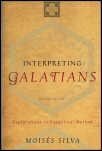
Interpreting Galatians addresses the key issues surrounding the exegesis of Galatians and the other Pauline Epistles, exploring how literary, historical, and theological factors influence interpretation. This second edition features a new appendix and will be welcomed by all those studying the Pauline Epistles.
New Testament scholars are confronted by many and diverse approaches to the text—linguistic, literary, historical, and theological. All too often such methods are uncritically or separately applied. In this well-written yet detailed book, Silva introduces the ways in which these approaches should be harnessed for our understanding of what the biblical authors intended. We are given hands-on experience with examples taken from Galatians. Readers are encouraged to apply his insights and critical judgments to other New Testament texts. Silva’s timely book will help students and pastors. It is warmly welcomed.
—J.K. Elliott, professor of New Testament textual criticism, University of Leeds
This volume is packed with information seasoned with sound advice. ‘Exegetical method’ carries a very wide sense—not just instructions on word study and sentence diagramming, but ‘explorations’ into mirror reading, linguistic theory, discourse analysis, and history of interpretation. Silva’s survey maintains the big picture but avoids oversimplifications and abstraction by concentrating on Galatians as a test case. Take up and read—you’ll learn a lot about Galatians, and much else too.
—Robert H. Gundry, scholar-in-residence and professor emeritus of New Testament and Greek, Westmont College
Silva has mastered the literature on Galatians from Aquinas to Zuntz, and offers wisdom from his years of research that the scholar will find invaluable. Students will also breathe a sigh of relief over his clear style and unpretentious, often humorous, approach to the subject. Both scholar and student will benefit from the example of erudition and humility characteristic of everything Silva writes.
—Frank Thielman, New Testament scholar and the Presbyterian professor of divinity, Beeson Divinity School
Many books are written today on how to do exegesis, and yet students are often frustrated by their abstract character. Silva’s work is distinctive, for he shows how to interpret the text by using Galatians as a case study. He offers sage advice on interpretive philosophy, textual criticism, Greek syntax, historical background, Pauline theology, and more! I learned much from this wise book, and I commend it enthusiastically to others.
—Thomas R. Schreiner, James Buchanan Harrison Professor of New Testament Interpretation and associate dean of Scripture and interpretation, Southern Baptist Theological Seminary
Moisés Silva (PhD, University of Manchester) has taught New Testament at Westmont College, Westminster Theological Seminary, and Gordon-Conwell Theological Seminary. He is author of the volume on Philippians in Baker Exegetical Commentary on the New Testament.
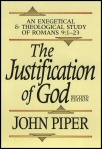
Undergirded by the author’s belief that the sovereignty of God is too precious a part of our faith to dismiss or approach weak-kneed, this book explores the Greek text and Paul’s argument with singular deftness.
I find The Justification of God the most compelling and forceful exposition of Romans 9:1–23 that I have ever seen. The Justification of God brings together the best scholarship on and exegesis of Romans 9.
Richard Muller, P.J. Zondervan Professor, Calvin Theological Seminary
Written in an irenic spirit with a keen awareness and interaction with all significant scholarly studies on Romans 9. Theology aside, it is a work of scholarship in its own right and the best on Romans 9.
—G.K. Beale, PhD Professor of New Testament and Biblical Theology, Gordon-Conwell Theological Seminary
Piper leads one through complex exegetical issues, engaging important literature fairly, summarizing the arguments frequently, and stating his conclusions (and warrants) clearly.
—Leander Keck, Winkley Professor Emeritus of Biblical Theology, Yale Divinity School
Even for non-Calvinists Piper’s work is too carefully reasoned and stays too close to the text to be ignored.
—David Dunbar, president and professor of theology, Biblical Theological Seminary
John Piper has been the pastor for preaching and vision at Bethlehem Baptist Church in Minneapolis, Minnesota, since 1980. He is a widely respected theologian and bestselling author. Piper attended Wheaton College where he majored in literature and minored in philosophy. He completed his bachelor of divinity at Fuller Theological Seminary, where he studied under Dr. Daniel Fuller. Piper received his doctorate in theology from the University of Munich and taught biblical studies for six years at Bethel College. His preaching and teaching is featured daily on the radio program, Desiring God. His writings and sermons are available from Logos in the Crossway John Piper Collection (39 vols.) and the The John Piper Sermon Archive (1980–2014).